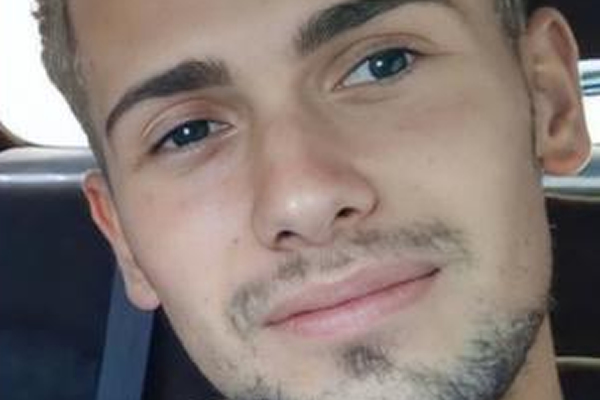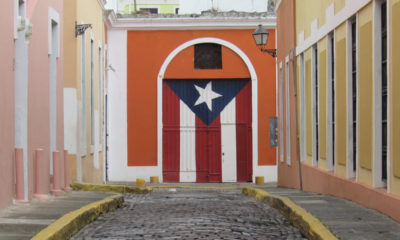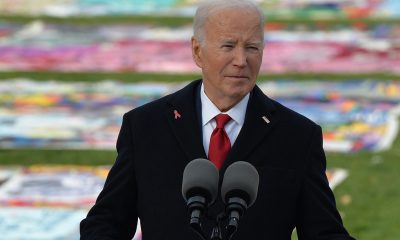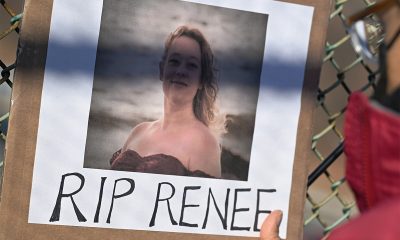World
Anti-gay murder in Spain sparks global outrage
Samuel Luiz Muñiz killed in A Coruña on July 3

Activists in Spain and around the world have condemned the murder of a 24-year-old man that has been categorized as an anti-gay hate crime.
Media reports indicate Samuel Luiz Muñiz, 24, was beaten to death early on July 3 after he and a group of friends left a nightclub in A Coruña, a city in northwestern Spain’s Galicia region.
The Associated Press cites Spanish media that say witnesses told police the group of people who attacked Luiz used anti-gay slurs against him. Authorities have reportedly detained two men and a woman in connection with Ruiz’s murder.
Fundación Triángulo, a Spanish LGBTQ rights group, organized a series of protests that took place in Madrid and in other cities throughout the country on Monday.
“We woke up on Saturday to the terrible news of the murder of Samuel, a young 24-year-old man from A Coruña, at the hands of a group of people who took his life by beating him while screaming ‘faggot’,” said Fundación Triángulo in a statement. “Terror, anguish, fear. This is what Samuel was able to feel before his death.”
✍️🏼 “No hemos llegado hasta aquí para volver a tener miedo de ser, estar o de amar. Ahora te toca a ti decidir de qué lado estás”.@SilviaTostado, presidenta de @TrianguloExt.#JusticiaParaSamuel 🏳️🌈https://t.co/t0egEe2khL
— Fundación Triángulo (@FTriangulo) July 6, 2021
A Coruña, Málaga, Madrid, Barcelona, Bilbao, Badajoz, Valencia, Sevilla… Unidos muy fuertes 💪 #JusticiaParaSamuel pic.twitter.com/oueIKmfGN3
— jaimefonta (@JaimeFontarg) July 6, 2021
Spanish Prime Minister Pedro Sánchez on Monday described Luiz’s murder as a “savage and depraved act.” The hashtag #JusticiaParaSamuel or #JusticeForSamuel has been trending on social media in Spain and around the world.
“Solidarity with Spain from Puerto Rico,” tweeted Pedro Julio Serrano, founder of Puerto Rico Para Tod@s, a Puerto Rican LGBTQ rights group, on Tuesday. “We join the global call (for) justice for Samuel.”
Solidaridad desde Puerto Rico a España.
Nos unimos al reclamo mundial: #JusticiaPorSamuel 🏳️🌈 pic.twitter.com/m6NzrlUpdY
— Pedro Julio Serrano (@PedroJulio) July 6, 2021
Colombia
Gay Venezuelan opposition leader: Country’s future uncertain after Maduro ouster
Yendri Rodríguez fled to Colombia in 2024 after authorities ‘arbitrarily detained’ him

A gay Venezuelan opposition leader who currently lives in Colombia says his country’s future is uncertain in the wake of now former President Nicolás Maduro’s ouster.
The Washington Blade spoke with Yendri Rodríguez on Thursday, 12 days after American forces seized Maduro and his wife, Cilia Flores, at their home in Caracas, the Venezuelan capital, during an overnight operation.
Maduro and Flores on Jan. 5 pleaded not guilty to federal drug charges in New York. The Venezuelan National Assembly the day before swore in Delcy Rodríguez, who was Maduro’s vice president, as the country’s acting president.
Rodríguez, who lives in the Colombian capital of Bogotá, described the events surrounding Maduro’s ouster as “very confusing.”
“It was a very surprising thing that left me in shock,” Rodríguez told the Blade. “We also thought, at least from the perspective of human rights, that the United States was going to respect international law and not go to the extreme of bombing and extracting Maduro.”
“Other questions also arise,” he added. “What could have been done? What else could have been done to avoid reaching this point? That is the biggest question posed to the international community, to other countries, to the human rights mechanisms we established before Trump violated international law, precisely to preserve these mechanisms and protect the human rights of Venezuelan people and those of us who have been forced to flee.”
Rodríguez three years ago founded the Venezuelan Observatory of LGBTIQ+ Violence. He also worked with Tamara Adrián, a lawyer who in 2015 became the first openly transgender woman elected to the Venezuelan National Assembly, for more than a decade.
Members of Venezuela’s military counterintelligence agency, known by the Spanish acronym DGCIM, on Aug. 3, 2024, “arbitrarily detained” Rodríguez as he was trying to leave the country to attend a U.N. human rights event in Geneva.
Rodríguez told the Blade he was “forcibly disappeared” for nearly nine hours and suffered “psychological torture.” He fled to Colombia upon his release.
Two men on Oct. 14, 2025, shot Rodríguez and Luis Peche Arteaga, a Venezuelan political consultant, as they left a Bogotá building.
The assailants shot Rodríguez eight times, leaving him with a fractured arm and hip. Rodríguez told the Blade he has undergone multiple surgeries and has had to learn how to walk again.
“This recovery has been quite fast, better than we expected, but I still need to finish the healing process for a fractured arm and complete the physical therapy for the hip replacement I had to undergo as a result of these gunshots,” he said.

María Corina Machado, who won the 2025 Nobel Peace Prize, and other Venezuelan opposition leaders said Maduro’s government targeted Rodríguez and Peche. Colombian President Gustavo Petro and his government also condemned the attack.
Colombian authorities have yet to arrest anyone in connection with the attack.
Rodríguez noted to the Blade he couldn’t sleep on Jan. 3 because “of the aches and pains” from the shooting. He said a friend who is “helping me out and looking after my things” was the one who told him about the operation the U.S. carried out to seize Maduro and Flores.
“He said, ‘Look at this! They’re bombing Caracas! And I was like, ‘What is this?'” recalled Rodríguez.
White House ‘not necessarily’ promoting human rights agenda
Rodríguez noted Delcy Rodríguez “is and forms part of the mechanisms of repression” that includes DGCIM and other “repressive state forces that have not only repressed, but also tortured, imprisoned, and disappeared people simply for defending the right to vote in (the) 2024 (election), simply for protesting, simply for accompanying family members.” Yendri Rodríguez told the Blade that “there isn’t much hope that things will change” in Venezuela with Delcy Rodríguez as president.
“Let’s hope that countries and the international community can establish the necessary dialogues, with the necessary intervention and pressure, diplomatically, with this interim government,” said Yendri Rodríguez, who noted hundreds of political prisoners remain in custody.
He told the Blade the Trump-Vance administration does not “not necessarily” have “an agenda committed to human rights. And we’ve seen this in their actions domestically, but also in their dealings with other countries.”
“Our hope is that the rest of the international community, more than the U.S. government, will take action,” said Yendri Rodríguez. “This is a crucial moment to preserve democratic institutions worldwide, to preserve human rights.”
Yendri Rodríguez specifically urged the European Union, Colombia, Brazil, and other Latin American countries “to stop turning a blind eye to what is happening and to establish bridges and channels of communication that guarantee a human rights agenda” and to try “to curb the military advances that the United States may still be considering.”

Yendri Rodríguez told the Blade he also plans to return to Venezuela when it is safe for him to do so.
“My plan will always be to return to Venezuela, at least when it’s no longer a risk,” he said. “The conditions aren’t right for me to return because this interim government is a continuation of Maduro’s government.”
Editor’s note: International News Editor Michael K. Lavers was on assignment in Bogotá, Colombia, from Jan. 5-10.
Iran
Grenell: ‘Real hope’ for gay rights in Iran as result of nationwide protests
Former ambassador to Germany claimed he has sneaked ‘gays and lesbians out of’ country

Richard Grenell, the presidential envoy for special missions of the United States, said on X on Tuesday that he has helped “sneak gays and lesbians out of Iran” and is seeing a change in attitudes in the country.
The post, which now has more than 25,000 likes since its uploading, claims that attitudes toward gays and lesbians are shifting amid massive economic protests across the country.
“For the first time EVER, someone has said ‘I want to wait just a bit,” the former U.S. ambassador to Germany wrote. “There is real hope coming from the inside. I don’t think you can stop this now.”

Grenell has been a longtime supporter of the president.
“Richard Grenell is a fabulous person, A STAR,” Trump posted on Truth Social days before his official appointment to the ambassador role. “He will be someplace, high up! DJT”
Iran, which is experiencing demonstrations across all 31 provinces of the country — including in Tehran, the capital — started as a result of a financial crisis causing the collapse of its national currency. Time magazine credits this uprising after the U.N. re-imposed sanctions in September over the country’s pursuit of nuclear weapons.
As basic necessities like bread, rice, meat, and medical supplies become increasingly unaffordable to the majority of the more than 90 million people living there, citizens took to the streets to push back against Iran’s theocratic regime.
Grenell, who was made president and executive director of the John F. Kennedy Center for the Performing Arts last year by Trump, believes that people in the majority Shiite Muslim country are also beginning to protest human rights abuses.
Iran is among only a handful of countries in which consensual same-sex sexual relations remain punishable by death, according to the Death Penalty Information Center.
Venezuela
AHF client in Venezuela welcomes Maduro’s ouster
‘This is truly something we’ve been waiting for’ for decades

An AIDS Healthcare Foundation client who lives in Venezuela told the Washington Blade he welcomes the ouster of his country’s former president.
The client, who asked the Blade to remain anonymous, on Thursday said he felt “joy” when he heard the news that American forces seized Nicolás Maduro and his wife, Cilia Flores, at their home in Caracas, the Venezuelan capital, during an overnight operation on Jan. 3.
“This is truly something we’ve been waiting for for 26 or 27 years,” the AHF client told the Blade.
Hugo Chávez became Venezuela’s president in 1999. Maduro succeeded him in 2013 after he died.
“I’ve always been in opposition,” said the AHF client, who stressed he was speaking to the Blade in his personal capacity and not as an AHF representative. “I’ve never agreed with the government. When I heard the news, well, you can imagine.”
He added he has “high hopes that this country will truly change, which is what it needed.”
“This means getting rid of this regime, so that American and foreign companies can invest here and Venezuela can become what it used to be, the Venezuela of the past,” he said.
The AHF client lives near the Colombia-Venezuela border. He is among the hundreds of Venezuelans who receive care at AHF’s clinic in Cúcuta, a Colombian city near the Táchira River that marks the border between the two countries.
The Simón Bolívar Bridge on the Colombia-Venezuela border on May 14, 2019. (Washington Blade video by Michael K. Lavers)
The AHF client praised U.S. President Donald Trump and reiterated his support for the Jan. 3 operation.
“It was the only way that they could go,” he said.
The Venezuelan National Assembly on Jan. 4 swore in Delcy Rodríguez, who was Maduro’s vice president, as the country’s acting president. The AHF client with whom the Blade spoke said he is “very optimistic” about Venezuela’s future, even though the regime remains in power.
“With Maduro leaving, the regime has a certain air about it,” he said. “I think this will be a huge improvement for everyone.”
“We’re watching,” he added. “The actions that the United States government is going to implement regarding Venezuela give us hope that things will change.”
-

 U.S. Supreme Court3 days ago
U.S. Supreme Court3 days agoSupreme Court hears arguments in two critical cases on trans sports bans
-

 Photos5 days ago
Photos5 days agoPHOTOS: ‘ICE Out For Good’ Sunday protests
-

 Virginia5 days ago
Virginia5 days agoMark Levine running in ‘firehouse’ Democratic primary to succeed Adam Ebbin
-

 Arts & Entertainment4 days ago
Arts & Entertainment4 days agoTeyana Taylor, Erin Doherty have big night at Golden Globes




















